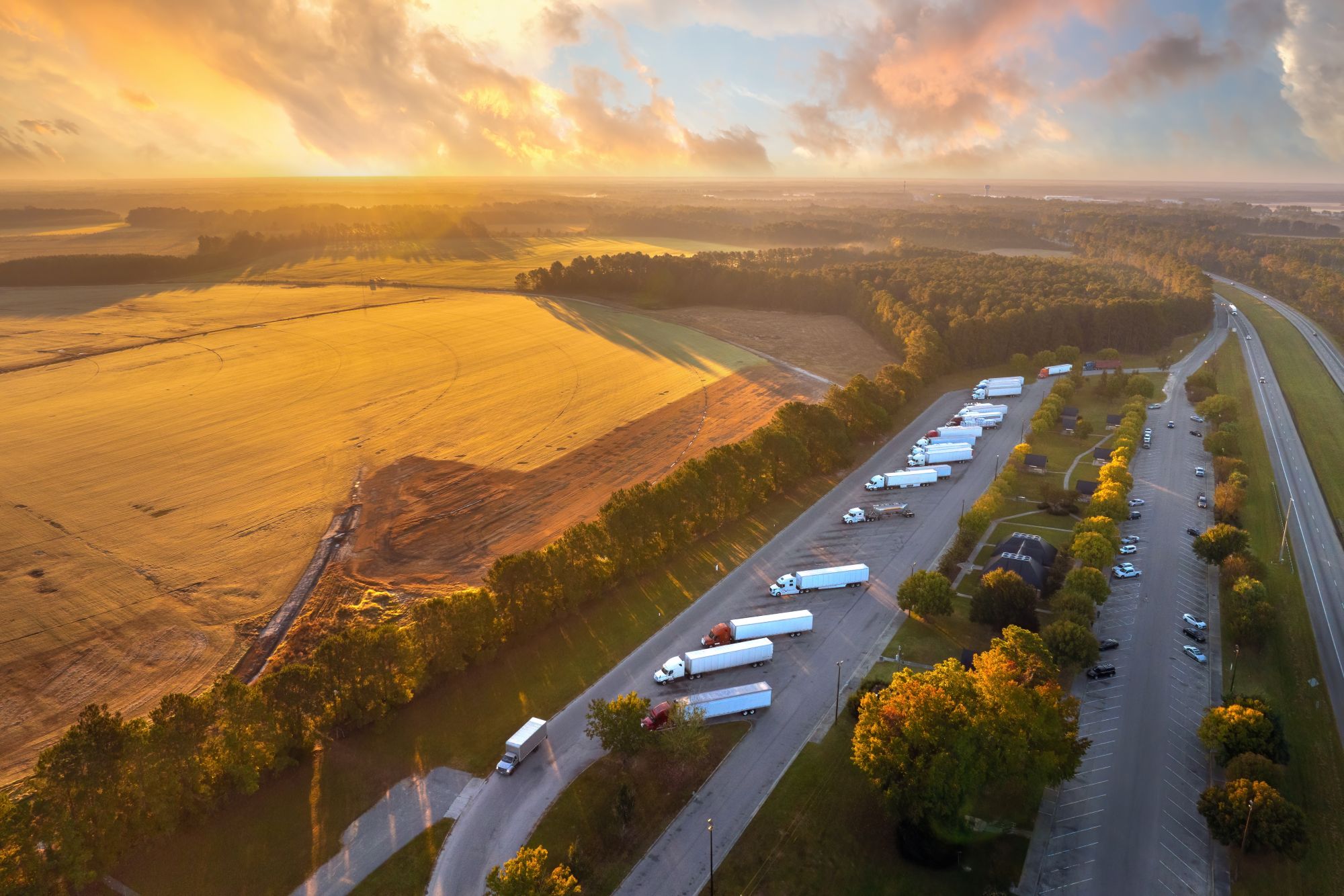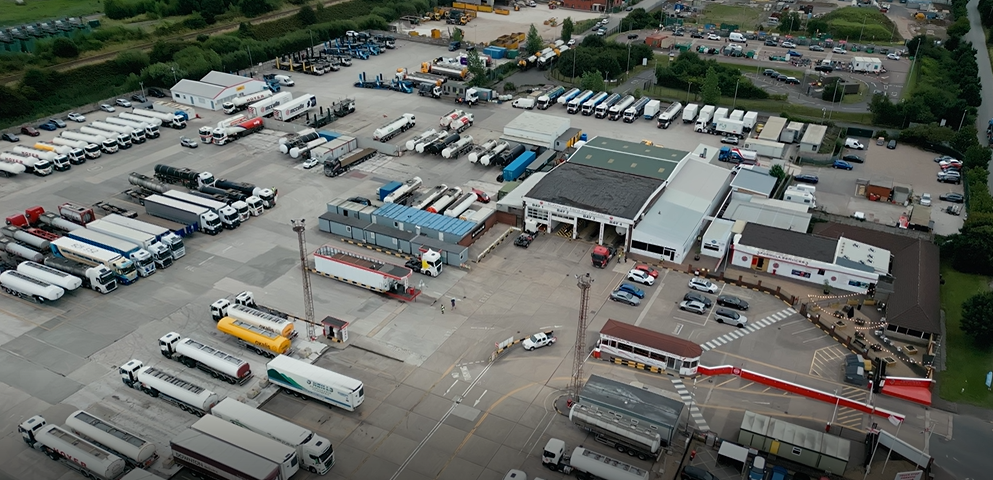
Miranda Blake
Tipps für die Sicherung Ihres Fahrzeugs: So schützen Sie Ihren Lkw vor Diebstahl
Erstellt: 14.11.2024
•
Aktualisiert: 14.11.2024
Speditionsunternehmen im Vereinigten Königreich und in Europa können das Risiko von Fahrzeug- und Ladungsdiebstählen erheblich verringern. Beim Schutz von Lastkraftwagen geht es nicht nur um die Sicherung des Fahrzeugs selbst, sondern um einen ganzheitlichen Ansatz, der Technologie, Schulung, Engagement in der Gemeinschaft und proaktive Planung umfasst. Mit den richtigen Maßnahmen können Fuhrparkmanager die Sicherheit der Fahrer und die Unversehrtheit der Vermögenswerte gewährleisten und so ein sicheres Umfeld für ihren Betrieb schaffen.
Was Fahrer tun sollten
Sichern des Fahrzeugs
Erhöhen Sie die Sicherheit Ihres Fahrzeugs, indem Sie verschiedene Vorrichtungen wie Vorhängeschlösser, eindeutig nummerierte Siegel und Kippseile verwenden. Diese sollten unmittelbar nach dem Beladen angebracht werden, um einen zusätzlichen Schutz vor unbefugtem Zugriff zu schaffen.
Eine gründliche Kontrolle ist unerlässlich. Nehmen Sie sich nach jedem Halt einen Moment Zeit, um Ihren Lkw und seine Ladung zu überprüfen. Achten Sie auf Anzeichen für Manipulationen oder verdächtige Aktivitäten. Wachsamkeit ist entscheidend, um Diebstähle zu verhindern.
Dokumentation
Führen Sie eine umfassende Checkliste zur Fahrzeugsicherheit. Sie sollte bei Bedarf für Grenzschutzbeamte oder andere Behörden einsehbar sein. Dies zeigt nicht nur Ihr Engagement, sondern hilft auch bei den Ermittlungen im Falle eines Diebstahls.
Sichere Orte
Entscheiden Sie sich für gut beleuchtete und belebte Parkplätze. Bereiche mit hohem Fußgängeraufkommen und Überwachungskameras sind für Diebe weniger attraktiv. Nutzen Sie nach Möglichkeit ausgewiesene sichere Parkplätze, die mit einem Zaun und modernen Überwachungssystemen oder Sicherheitspersonal ausgestattet sind. Diese Plätze bieten eine zusätzliche Sicherheitsebene. Wählen Sie für das Parken über Nacht beleuchtete und überwachte Plätze.
Finden Sie sichere Lkw-Parkplätze auf Ihrer Transitstrecke mit Hilfe der [SNAP-Karte] (https://snapacc.com/map/).

Technologie und Ausrüstung
Der Einsatz fortschrittlicher Technologie kann die Sicherheit Ihres Fahrzeugs erheblich verbessern. Rüsten Sie Ihren Lkw mit modernen Systemen wie GPS-Ortung, Wegfahrsperre und Panikalarm aus. Diese schrecken nicht nur vor Diebstahl ab, sondern helfen auch bei der Wiederbeschaffung, wenn es zu einem Zwischenfall kommt.
Routenplanung
Außerdem können Sie durch eine effektive Planung Ihrer Fahrten Risikobereiche vermeiden. Nutzen Sie eine Software, mit der Sie Ihre Lieferrouten planen und dabei bekannte Gefahrenpunkte für Frachtdiebstähle meiden können. Durch den Einsatz von Telematik- und GPS-Technologien zur Überwachung Ihres Fahrzeugs in Echtzeit können Sie dessen Standort verfolgen und sicherstellen, dass die geplanten Fahrten eingehalten werden.
Was Flottenbetreiber tun sollten
Sicherheitsprotokolle und -systeme
Ein klar definiertes Sicherheitsprotokoll ist für alle Fahrer unerlässlich. Als Fuhrparkbetreiber können Sie umfassende schriftliche Richtlinien erstellen, in denen die von den Fahrern zu befolgenden Sicherheitsmaßnahmen im Einzelnen aufgeführt sind. Auf diese Weise wird sichergestellt, dass alle Beteiligten in Bezug auf die Sicherheitspraktiken auf derselben Seite stehen.
Sie sollten die Fahrer darin schulen, wie sie die in ihren Lastwagen installierten Systeme effektiv nutzen können. Die Vertrautheit mit diesen Geräten kann deren Wirksamkeit erhöhen. Es ist auch eine gute Idee, sie über potenzielle Bedrohungen und die Bedeutung der Wachsamkeit aufzuklären. Sie sollten wissen, welche Taktiken Diebe häufig anwenden und wie sie angemessen reagieren können.
Wenn Sie Ihre Lkw in optimalem Zustand halten, verringert sich das Risiko von Pannen, die zu Diebstahl führen könnten. Führen Sie einen proaktiven Wartungsplan ein, um sicherzustellen, dass Ihre Fahrzeuge immer in gutem Zustand sind. Regelmäßige Kontrollen können mechanische Ausfälle verhindern, die Ihre Lkw angreifbar machen könnten.
Kommunikation und Gemeinschaft
Die Einrichtung klarer Kommunikationskanäle ist für ein effektives Sicherheitsmanagement unerlässlich. Sorgen Sie für eine offene Kommunikation zwischen Fahrern, Disponenten und Sicherheitspersonal. Dies ermöglicht die sofortige Meldung verdächtiger Aktivitäten oder Fahrzeugprobleme. Ermutigen Sie die Fahrer, sich während ihrer Schicht regelmäßig zu melden.
Durch die Zusammenarbeit mit der örtlichen Gemeinschaft können Sie Ihre Sicherheitsmaßnahmen verbessern. Arbeiten Sie mit anderen Unternehmen und den örtlichen Strafverfolgungsbehörden zusammen, um Informationen über potenzielle Bedrohungen auszutauschen. Ein gemeinsames Vorgehen kann das Bewusstsein schärfen und zu effektiveren Strategien zur Verbrechensverhütung führen. Beteiligen Sie sich an Initiativen in der Gemeinde, die sich auf dieses Thema konzentrieren - durch den Aufbau von Beziehungen kann ein Unterstützungsnetzwerk entstehen, das zum Schutz Ihrer Vermögenswerte beiträgt.
Reaktionspläne
Ein solider Plan für Notfälle kann die Auswirkungen eines Diebstahls abmildern. Entwickeln Sie klare Protokolle für die Reaktion auf Vorfälle. Darin sollten Schritte für die Meldung des Vorfalls, die Kontaktaufnahme mit den Strafverfolgungsbehörden und die Benachrichtigung Ihrer Versicherung enthalten sein. Sorgen Sie dafür, dass alle Fahrer mit diesen Protokollen vertraut sind - sie sollten wissen, wie sie schnell und effektiv handeln können.
Situationsbewusstsein
Die Sensibilisierung der Fahrer für ihre Umgebung kann Diebstählen vorbeugen. Bringen Sie ihnen bei, wie sie verdächtige Aktivitäten rund um ihr Fahrzeug erkennen können, und ermutigen Sie sie, ihrem Instinkt zu vertrauen und ungewöhnliche Vorkommnisse zu melden. Betonen Sie außerdem, wie wichtig es ist, der persönlichen Sicherheit Vorrang vor der Ladung einzuräumen. Wenn sie mit einem Dieb konfrontiert werden, sollten sie sich fügen und den Vorfall den Behörden melden, sobald es sicher ist.
Überwachung von Kraftstofftransaktionen mit SNAP
Wir bieten ein intelligentes Bezahlsystem an, das automatisch Kraftstofftransaktionen erfasst und verfolgt. Wenn die Fahrer ihre Fahrzeuge an einer der über 3.500 Tankstellen in ganz Großbritannien betanken, zeigen sie einfach ihre SNAP-Tankkarte vor, um die Transaktion zu bezahlen, wodurch Bargeld oder Kreditkarten überflüssig werden und der Prozess rationalisiert wird.
Das System bucht jede Kraftstofftransaktion automatisch auf das Konto, das mit dem Kennzeichen des Fahrzeugs verknüpft ist. Durch diese Automatisierung entfällt für die Fahrer die Notwendigkeit, Quittungen manuell zu erfassen und einzureichen, was den Verwaltungsaufwand und das Fehlerpotenzial verringert.
Fuhrparkleiter erhalten monatliche Einzelverbindungsnachweise, die einen detaillierten Überblick über die Aktivitäten aller Fahrzeuge geben, was eine einfache Überwachung des Kraftstoffverbrauchs und der Ausgaben für die gesamte Flotte ermöglicht.
SNAP Fuel lässt sich in andere SNAP Account-Dienste integrieren, so dass Flottenmanager nicht nur Kraftstofftransaktionen, sondern auch Park- und Waschdienste in einem einzigen Konto überwachen können, was einen umfassenden Überblick über Betrieb und Ausgaben ermöglicht. Erfahren Sie hier mehr über SNAP Fuel.



